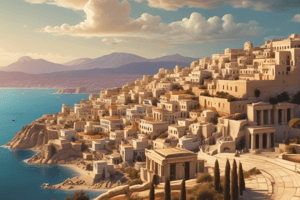Podcast
Questions and Answers
What were some of the uses of the animals reared by farmers in ancient Greece?
What were some of the uses of the animals reared by farmers in ancient Greece?
- For cloth manufacturing
- To fertilize crops (correct)
- For transportation purposes
- To make bread and pastries
Which of the following was NOT a fodder provided to the animals in ancient Greece?
Which of the following was NOT a fodder provided to the animals in ancient Greece?
- Meat scraps (correct)
- Fallen and damaged fruit
- Chaff and straw
- Residues of grapes and olives
What were some of the foodstuffs traded within Greece between citizens at markets and different cities?
What were some of the foodstuffs traded within Greece between citizens at markets and different cities?
- Eels and honey (correct)
- Cotton and silk
- Tea and coffee
- Apples and oranges
Which port in Athens became the most important trading centre in the Mediterranean during the 5th century BCE?
Which port in Athens became the most important trading centre in the Mediterranean during the 5th century BCE?
What was a notable exception to the state's limited involvement in trade and the sale of agricultural products in ancient Greece?
What was a notable exception to the state's limited involvement in trade and the sale of agricultural products in ancient Greece?
What was the punishment for offenders who obstructed the import of grain into Athens?
What was the punishment for offenders who obstructed the import of grain into Athens?
What role did the 'sitophylakes' have in ancient Greece?
What role did the 'sitophylakes' have in ancient Greece?
'Agoranomoi' were officials responsible for what aspect of trade in ancient Greece?
'Agoranomoi' were officials responsible for what aspect of trade in ancient Greece?
Which of the following cities was NOT mentioned as an important trade center throughout the Hellenistic and Roman periods?
Which of the following cities was NOT mentioned as an important trade center throughout the Hellenistic and Roman periods?
'Thasos' implemented trade incentives to encourage the export of what product?
'Thasos' implemented trade incentives to encourage the export of what product?
Flashcards are hidden until you start studying
Study Notes
Agriculture in Ancient Greece
- The majority of Greek city-states' prosperity was based on agriculture, which allowed for a surplus of goods to be traded for necessities.
- Cereals, olives, and wine were the three most produced foodstuffs, suitable for the Mediterranean climate.
Land Ownership and Farming
- The state did not control farming, and crops were grown and livestock reared by private individuals on their own land.
- Smallholdings were the norm, with farms ranging from 5 ha (poorer citizens) to 20 ha (aristocracy) in Athens, and 18 ha to 44 ha in Sparta.
- The poorest citizens had no land and worked on others' land for pay or leased land to work it themselves.
Crops and Crop Management
- Crops produced were selected for their suitability to the Mediterranean climate, including wheat, barley, millet, pulses, vines, and olives.
- Wheat and barley crops were susceptible to crop failure due to insufficient water supply.
- Crop rotation, fallow fields, and irrigation were used to maintain soil fertility and moisture.
- Ploughing, sowing, and harvesting were done at specific times of the year, with winnowing, threshing, and storage done in June-July.
Animal Husbandry
- Many private households kept a small number of animals, including sheep, goats, pigs, chickens, and cattle, for their meat, milk, eggs, wool, and leather.
- Animals were reared in greater numbers where the local terrain was not suitable for agriculture.
- Animals were fed fodder of chaff, straw, vegetable plants, and residues of grapes and olives.
Trade of Foodstuffs
- Most farmers produced sufficient foodstuffs for their own family's needs, but bartered surplus produce for everyday necessities and foodstuffs they did not produce themselves.
- Wealthier citizens with larger plots produced cash crops, which they sold in bulk at markets.
- Agricultural products traded within Greece included cereals, wine, olives, figs, pulses, eels, cheese, honey, and meat.
- Greek merchant ships exported goods to Egypt, Magna Graecia, and Asia Minor, including wine, olives, and olive oil.
State Intervention
- The state's involvement in trade and the sale of agricultural products was relatively limited, except for grain, which was controlled to ensure populations did not starve in times of drought.
- Market officials ensured the quality of goods on sale in the markets, and grain had its own supervisors who regulated prices and quantities.
- City-states imposed taxes on the movement of goods and levies on imports and exports at ports, but also took measures to protect internal trade and incentivize exports.
Studying That Suits You
Use AI to generate personalized quizzes and flashcards to suit your learning preferences.




